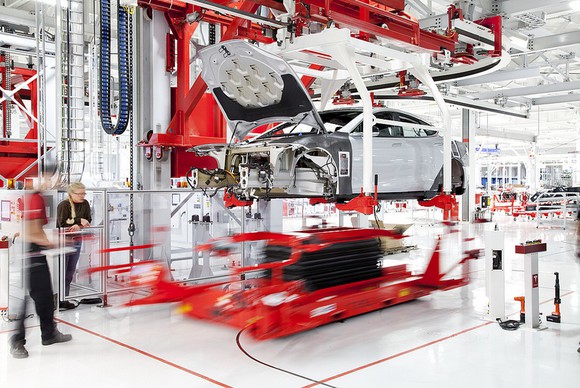24 Mar 1 Thing Tesla Has to Do Sooner Rather Than Later
The Motley Fool, March 16, 2018
China has long been the promised land for many global automakers, and it’s not difficult to imagine why: In 2007, China accounted for roughly 10% of global auto sales, and in 2017, that had jumped to roughly 30%. Not only does China account for that large chunk of global sales, there’s still room for growth as its middle class grows. For Tesla (NASDAQ:TSLA), China is more than just auto sales; electric vehicles are being pushed heavily by the government, and that’s why Tesla must open a plant in the country.
What’s the big deal?
It’s a well-known fact that foreign automakers must partner up with a domestic Chinese automaker to produce vehicles in the country to avoid a steep 25% import tariff. It’s a tough requirement, but China understands its massive market of consumers is tantalizing enough that automakers will jump at the opportunity. Further, China’s government has waived sales tax on EVs through 2020, compared to a 10% sales tax for other vehicles, helping boost demand.
And yet Tesla, the most well-known U.S. electric vehicle automaker, hasn’t been able to open a factory in China despite the government incentivizing its citizens to buy electric vehicles to help offset pollution woes. The government’s strategy has worked: In 2017 China’s passenger car sales increased a modest 1.4% to 24.72 million, slowing from the prior year’s 15% growth. Sales of electric vehicles in China, though, jumped 53% to 777,000 units.

IMAGE SOURCE: TESLA.
What’s the holdup?
It’s not as if Tesla has completely balked at the idea of opening a factory in China. It’s been working with Shanghai’s government to find a solution, but the two entities disagree on details for ownership of a proposed factory. “The current rules make things very difficult. It’s like competing in an Olympic race wearing lead shoes,” Tesla CEO Elon Musk wrote, according to Reuters.
The issue is the requirement other global automakers have given in to: accepting a joint venture with a Chinese automaker. Tesla wants to own the factory entirely. However, if Tesla would accept the less than ideal scenario of a joint venture, it could produce the vehicles at a more economic price in the world’s largest automotive market.
“It’s going to be a much narrower lane for Tesla,” said Bill Russo, CEO of Shanghai-based Automobility Ltd., according to Bloomberg. “If you are double the price of the competition, then you are always going to be struggling.”
Sure, a joint venture would suck some of the profitability from Tesla and its shareholders, and the risk is that the domestic Chinese automaker learns a thing or two from Tesla and its vehicles, but the growth is worth the risk. Consider that EV sales in China could balloon to top 1 million in 2018, and the government’s target for 2025 is a staggering 7 million vehicles annually.
In 2015, Tesla’s China revenue was $318.5 million. That revenue jumped to $1.07 billion and $2.03 billion in 2016 and 2017, respectively — imagine what it could do avoiding tariffs with a factory in China? In November, Musk commented during a conference call that the company was at least three years away from producing vehicles in China. Playing hardball is great, and negotiating is important, but as an investor considering owning Tesla shares, please do one thing and just agree to the joint venture!



Sorry, the comment form is closed at this time.